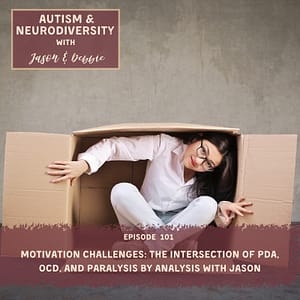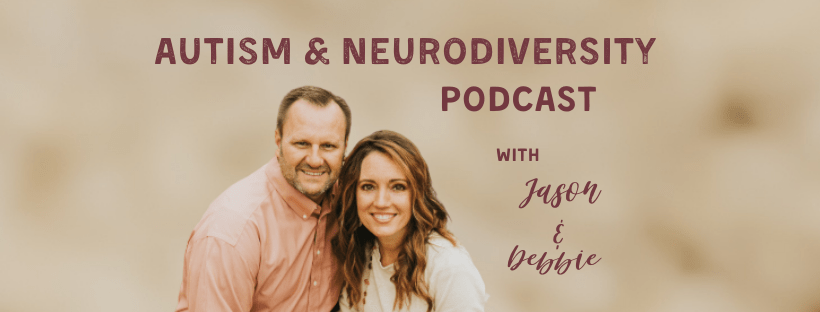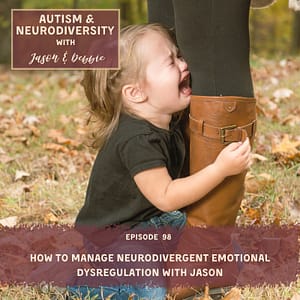Speaker A: Welcome to the Autism and Neurodiversity podcast.
Speaker B: We’re here to bring you helpful information from leading experts and give you effective tools and support. I’m Jason Grygla, a licensed counselor and founder of Techie for Life, a specialized mentoring program for neurodiverse young adults.
Speaker A: And I’m Debbie Grygla, a certified life coach. And maybe most importantly, we’re also parents to our own atypical Young Adults.
Speaker B: Hello, I’m Jason Grygla, and it’s great to be with you on the Autism and Neurodiversity podcast. I’m going to talk to you today about an aspect of emotional dysregulation that we experience all the time but we probably don’t talk about enough. And that is the pattern that is pretty common, where our neurodivergent loved ones are experiencing over, intense emotions, overstimulation, and the dysregulation that comes from being overly excited, too much anticipation, too much pressure to have a good time. And how many of us have experienced that birthdays or Christmases or vacations are so intense for anticipation and expectation and unknown and even pleasure and excitement and joy that they become overstimulated and dysregulated in too positive of a direction, which always ends up crashing.
And it kind of reminds me of a tire that if it’s underinflated, it’ll overheat and break and you’ll get a ruined flat tire. And if you overinflate a tire, it actually also can heat up and wear in the wrong ways and also pop. So a tire needs to be at just the right inflation level, similar to our emotional regulation state. Being in the middle is the right thing. Overstimulation, bad, under-stimulation, also bad. And so one of the things that we experienced and that we often see is when someone is really excited about something because they are often in their lower brain more than normal, is that they’re pleasure seeking and they’re excitement seeking. And so they might be carb eaters because they just want lots of feel good carbs. They want the constant stimulus of the screen and whatever it is that they do that is obsessive or compulsive.
But I just remember how many times something that was supposed to be an awesome experience ended in tears, ended in crises, and I was just left as a father thinking, what on earth? How am I ever supposed to have a positive experience? If our positive experiences go bad and our negative experiences go bad? It’s like we can’t win and they can’t win. And I would feel so bad for them because of the intensity of their emotions that would help them to crash.
I always remember wanting to make Christmas big because it was big in my home growing up. And I loved it. It was magical. And yet the more we talked it up with my two neurodivergent sons, the more we talked it up and got them excited, the worse it ended up being. They couldn’t stop thinking about it. They couldn’t sleep. Then they were up all night, literally up all night. And then the next day they were cranky and miserable and it wouldn’t work. How many times have we given them a present that was just so perfect and exactly what they wanted, only to have them become overstimulated with it and break it or be so protective of it that they wouldn’t share or they wouldn’t get off of it. And then it became obsessive compulsive and then it was parenting through discipline and consequences and then that turned into a problem.
It’s hard for me to know where that balance is because I want them to have great experiences, but if they can’t handle it and we know it’s going to be a negative experience because it’s just too intense, just know that intensity too good or too bad leads to dysregulation, which always leads to crises. I think one of the things that we learned as parents was to not make something into too big of a deal, no matter what it was. If we made it into a big deal that they graduated from 8th grade, then they would actually diminish and dismiss what they did. That was great because they couldn’t handle all the praise or all the excitement and the celebrations surrounding it.
I know that we started buying them presents that weren’t breakable. If they lost them, that’s different. I think one of the best presents we ever bought them, and I think I talked about this once on a podcast, was a whole carton crate full of broken electronics that were not salvageable or fixable. And that crate was full of old electronics from the they spent hours taking things apart, breaking them with hammers and tools and saws and it was the coolest present we ever got because the whole job was to take it apart and destroy it. And there was no problem with that. As a matter of fact, it was encouraged and I really think they enjoyed that for six or eight months straight. They would work on one machine for several weeks and then when it was done, they would start on the next. They found cool magnets and stuff, but I’m thinking that until they have more practice, it’s not good to get them all excited and it’s not good to get them all worked up.
Sometimes going on vacations is for us and not for them. And so I remember having our son not go on some of our vacations when they really didn’t want to go. It was what I wanted for our family, but they weren’t going to have any fun in a new place. It was going to be overwhelming. We were going to be in cramped quarters. There wouldn’t be WiFi or cell phone coverage to keep them emotionally regulated on their screen, which I know sounds terrible, but it was a reality. Other times it was great to just go out in nature and go camping where they could just run and be free and that was fine. Once they got used to the fact that there wasn’t electronics. They looked under rocks and built forts and entertained themselves pretty good, but we would never talk it up.
We would kind of just keep everything, eh, it’s going to be cool, but it’s not a big deal. And even when things went really bad, like, Eh, it’s not that big of a deal, that’ll be fine. And I think not being a stimulus from the outside to freak out when they hurt themselves or cut themselves and be like, oh my gosh, you’re bleeding, and get them more dysregulated. I think we learned to do that pretty quickly, to not make anything a big deal. But also on the other end, we’re going to go to Hawaii or to Mexico and it’s going to be so awesome, and we talk it all up only to have them completely freaked out on the drive and when we got there, and we all paid a price for that. I think that’s sad and it’s hard. And it’s also another thing that we have to manage when we take on mentoring, nurturing, parenting, someone who’s neurodivergent and has emotional dysregulation.
Not that neurodivergents are all dysregulated, and not that all people who are dysregulated are neurodivergent, but it is a common theme. I’m actually wondering how many of you have experienced the same thing where birthday presents or birthdays or Christmases always became way too much. And I’d love to have some emails and some feedback on that or even some comments below in our podcast notes.
So thanks for joining me today. We’re going to keep coming with podcasts. Debbie and I have been really busy prepping our launch of a new app and a program for supporting and teaching neurodevelopmental mentoring. We’re excited about it. We’ve been doing videos and writing the trainings for those, so that’s been keeping us busy. But look out for that because it’s coming soon and we hope you’ll join us. Thanks. Bye you.
Speaker B: Thanks for joining us on this episode of Autism and Neurodiversity with Jason and Debbie. If you want to learn more about our work, come visit us at JasonDebbie.com. That’s JasonDebbie.com.




